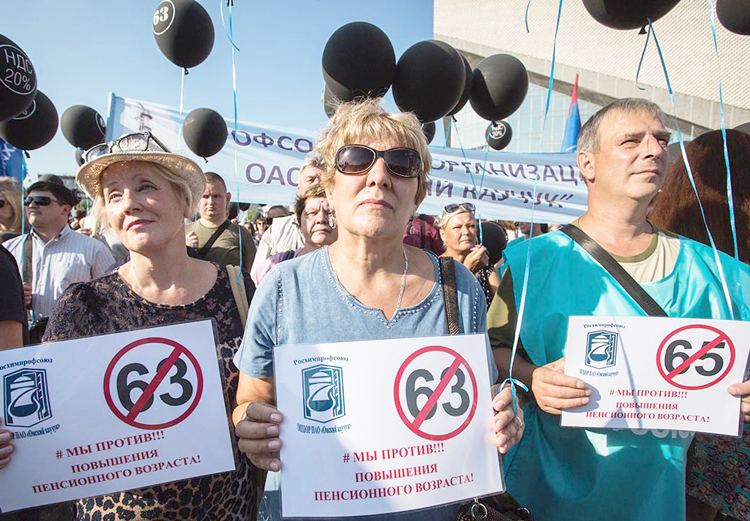When the Russian government announced plans to raise the retirement age for workers on the eve of the World Cup, it hoped this would be drowned out by the football euphoria.
But the proposal provoked widespread anger and protests across the country. In face of this, the government of President Vladimir Putin told a compliant media and the ruling United Russia party to stop using the words “pension reform.” Putin’s popularity rating dropped by 10 percent in one month and in a July 8 poll only 49 percent said they’d vote for him. This is his lowest rating in years.
In 2005 Putin promised not to touch the retirement age “as long as I’m president.” He has declared that he has “not been taking part in that process,” hoping this gives him room to deny any personal responsibility.
Prime Minister Dmitry Medvedev announced the proposal June 14. It would raise the retirement age by eight years to 63 for women in stages through 2034 and by five years to 65 by 2028 for men. The State Duma approved it in the first hearing of the required three on July 19. The deadline for amendments was extended to Sept. 24.
Deputies of Putin’s United Russia voted in favor, while deputies from the Duma’s other parties — the conservative Liberal Democratic Party of Russia, the Communist Party and Fair Russia — voted against.
“The deputies should go to the cemeteries and see how many men there are who died at the age of 61 or 62,” Sergei Shatsky, 50, told the Moscow Times as he protested with a couple hundred others outside parliament July 19. “Seven of my close friends have already died.”
Average life expectancy for women in Russia is 77 years, for men it’s 66. But the averages hide the class reality; workers and farmers die much younger. Many rural and urban working people will never live to retire. In over half of the country’s 83 regions, especially in the Asian east, male average life expectancy doesn’t reach 65.
More than 1,500 people came from the Kuzbass region, a coal-mining area, to a July 3 protest in Kemerovo, organized by the Federation of Trade Union Organizations in Kuzbass. “We are 80 people, representatives of the Sibirginskaya mine,” Sergei Balynin told Radio Svoboda. “The miners live approximately for 62 years, so no one will survive until retirement.”
Dozens of protests have taken place across Russia, most called by the opposition parties in the State Duma, followers of Alexei Navalny, smaller political groups and local coalitions.
These protests come alongside growing anger at the Russian capitalist rulers’ continuing wars — and workers’ deaths — in Syria and Ukraine. Jobs and wages, especially in small towns and rural areas, are hard to come by, driving youth to sign up for the military. Relatives hear thirdhand that they’ve been killed, especially when their employer is a “private” Russian army.
Signs at the protests are blunt. In Novokuznetsk, one sign read, “Born, worked, retired, died.” Others mocked the double-speak spread by government spokespeople, reading, “War is peace,” “Freedom is slavery,” and “Ignorance is power.” In Tomsk, one participant brought a poster saying, “Gift to Medvedev — did not live until retirement,” and in Yakutsk, “A short life — a pledge of prosperity of the pension fund.” And in Barnaul one read, “OK, Google! How to survive until retirement?”
Svetlana Yurievna turned out July 3 for a rally of 300 in Saratov. She told Svoboda she has never been in a protest before.
“Now I’ll go to everything,” she said. “Because I’m against it. Against our government, against Medvedev, against this cannibalistic policy. Yes, I went to the polls and voted for Putin. And I supported Putin because he said, ‘As long as I am president, there will be no increase in the retirement age.’ And now those words have disappeared. But we still hope. He has not yet spoken, and we hope.”
Putin cultivates the image of a ruler standing aloof from domestic issues, leaving them to the “experts.” That leaves room for him to maneuver if things go bad.
In the face of the protests, he spoke out July 20, saying no final decision has been made. “I do not like anything related to raising the retirement age, I assure you,” he told news agency TASS. “And in the government there are few people, if any, who like it.”
Most people keep working for as long as they can because the pensions are too meager to live on, averaging only $210 a month. The idea of raising the age means you won’t ever get one at all and this is making people mad.


